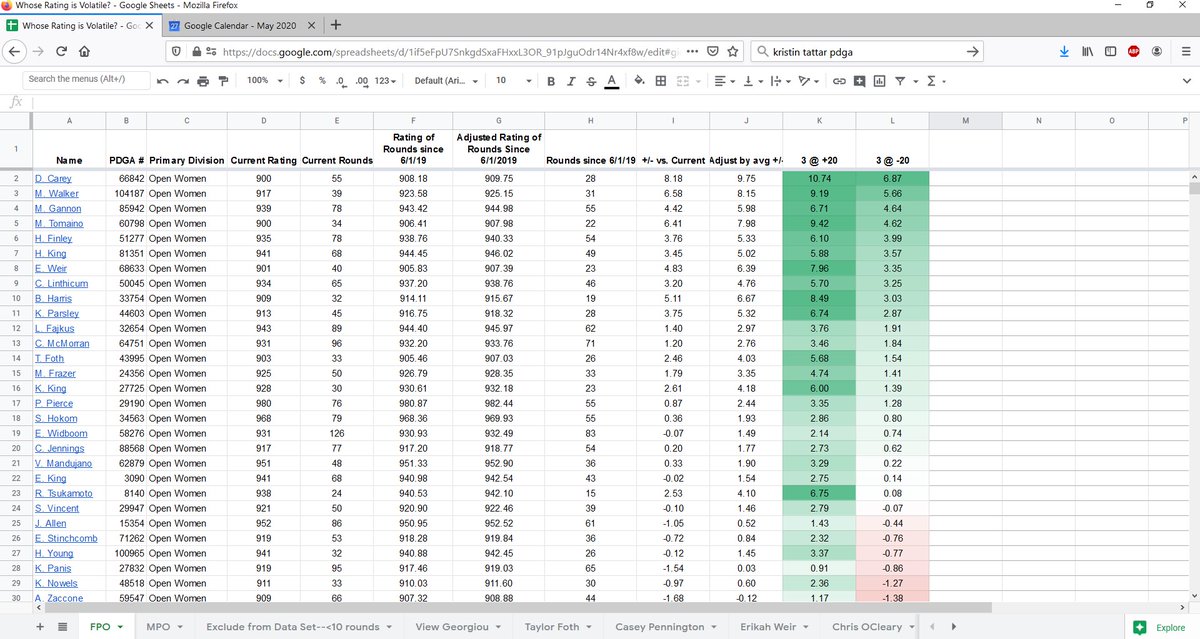
It has been exciting to see high-profile disc golf player contracts and the attention they get from a variety of media/fan/other player sources. At the risk of lobbying against myself and my peers, I want to think a little bit differently about the future these contracts portend.
It’s not wrong for manufacturers to pay players to endorse their products. It’s also not wrong for players to capitalize on their value. This thread is more about the collective disc golf world reconsidering who and what provide value to the sport, and recalibrating accordingly.
Who or what has driven the long-term growth and recent boom in disc golf participation? That’s a complex answer: we can’t really itemize locally or worldwide. The current trend is to attribute it primarily to media exposure and the pro scene, but I think that’s too simplistic.
DG media and pro events both grew on an infrastructure largely built by volunteers. We’re enjoying a collective benefit of 40+ years of mostly unpaid labor from folks who helped because they believed in an ideal version of the sport represented by their local courses or events.
Fundamentally I don’t think this perspective is that different from saying that the DGPT owes a great debt of gratitude to the organizational infrastructure the PDGA built.
https://twitter.com/sully68783/status/1441430466284990467?s=20
In recent years, the Overton window regarding TDs being paid has shifted somewhat. There are professional course designers and graphic designers, etc. Pay to Play courses work in some places. Most municipal parks pay landscaping crews for mowing and basic maintenance.
In large part, though, the disc golf ecosystem is still heavily reliant on unpaid, or underpaid, labor to maintain courses, run leagues and tournaments, and provide volunteers (spotters, scorers, crowd control, parking, water fillers, and far more) at events.
What's the expected "lifetime" of a TD? I know plenty who get frustrated and quit because it's like having a second job with 72+ annoying bosses AND you have to fundraise for it instead of getting paid.
What’s the expected “lifetime” of a volunteer? How many volunteers can sustain high effort for a long period to keep a course in good shape? Conversely, how many disc golfers are at the course every day but “aw, can’t make it, sorry” when it’s time for a workday?
Despite the financial and media success that (men’s) mainstream professional sports enjoy in the US and worldwide, I think there are numerous improvements they could make for their impact on society–today in particular valuing the contribution of support staff at all levels.
I think it’s great that pro players are being paid and valued. They are a public-facing promotional arm of disc golf manufacturers (discs, bags, and other equipment), and symptomatic of the AWESOME rate of growth that disc golf has experienced at all levels.
In order to sustain that rate of growth–including casual play and event participation, and yes, disc sales– without toppling the sport's structure, I believe that it is essential that we shift or expand our thinking about who provides value to the sport and community.
There aren’t million-dollar deals for pros today without faceless armies in the 1980s clearing and mowing to make object courses, or persistently lobbying a parks department. There isn’t a Maple Hill without a Sedgley Woods. (Shout out to DG history podcast @RootsofFlightDG!)
I think it’s vital to the long-term health of disc golf that we normalize allowing reasonable compensation to extraordinary volunteers–and that requires a broad community refocusing of resources and appreciation to the base of the pyramid.
I think refocusing is best applied locally by adjusting player expectations to budget for course maintenance, and club structures that can at a minimum cover expenses for their most reliable volunteers.
I think it’s best applied more broadly by PDGA enabling TDs to make a reasonable profit, so that they aren’t always comparing the opportunity cost of organizing events (and putting up with your whining before, during, and after) with literally anything else in their lives.
I think it’s also applied broadly by the PDGA by endorsing that a player’s experience in sanctioned events has an inherent value, and allowing a greater portion of entry fees than is currently allowed to be claimed for venue expenses and staff/volunteer time.
I think as a community culture it requires collectively not reflexively thinking that club/course fundraising drives, TDs, and others are taking advantage of us. I think it requires not being fixated on our own playing or viewing experience, but instead on everyone else’s.
If you’re averse to the idea of paying volunteers (it is a little paradoxical), an alternative way of framing valuing volunteers is to create a culture where there is an expectation of everyone in the community pulling weight to keep the infrastructure in order.
If you want more disc golf, or a more professional representation of disc golf, the local level is every bit as important as the pro scene. An organized, sustainable club or course requires continuity and broad support to avoid TD and volunteer burnout.
I therefore ask you to reconsider what elements of disc golf you appreciate. What elements are reliant (directly or indirectly) on someone else’s good will, time and effort? How can you, I, and we create a disc golf community with institutional support for those people?
Disc golf is still small enough that we can chart a path divergent from how every other sport has tried. It’s possible for manufacturers to pay players for their performance and visibility AND to collectively value the unsung maintainers and organizers.
• • •
Missing some Tweet in this thread? You can try to
force a refresh




